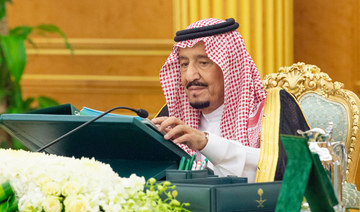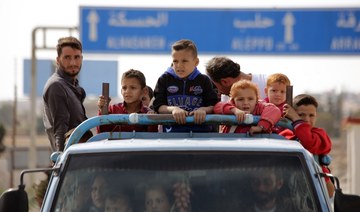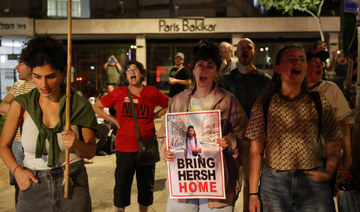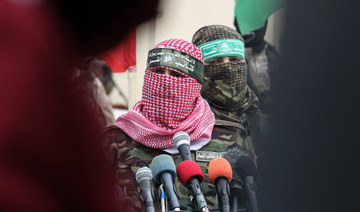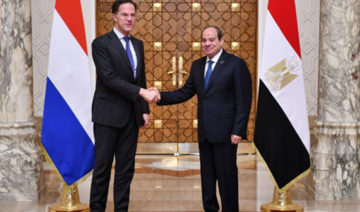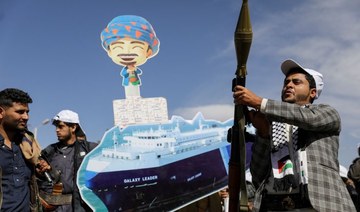ANKARA: US Vice President Mike Pence met President Tayyip Erdogan in Turkey on Thursday on a mission to persuade him to halt an offensive against Kurdish fighters in northeast Syria, but Turkish officials said the action would continue regardless.
The assault has created a new humanitarian crisis in Syria with 200,000 civilians taking flight, a security alert over thousands of Daesh fighters abandoned in Kurdish jails, and a political maelstrom at home for President Donald Trump.
Trump has been accused of abandoning Kurdish-led fighters, Washington’s main partners in the battle to dismantle Daesh’s self-declared caliphate in Syria, by withdrawing troops from the border as Ankara launched its offensive on Oct. 9.
Trump defended his move on Wednesday as “strategically brilliant.” He said he thought Pence and Turkish President Recep Tayyip Erdogan would have a successful meeting, but warned of sanctions and tariffs that “will be devastating to Turkey’s economy” otherwise.
The White House released a letter from Trump to Erdogan from Oct. 9 that said: “Don’t be a tough guy” and “Don’t be a fool!” Turkish broadcaster CNN Turk said Turkey had rejected Trump’s appeal to reach a deal to avoid conflict and the letter was “thrown in the trash.”
A Turkish official told Reuters: “The letter Trump sent did not have the impact he expected in Turkey because it had nothing to take seriously.
“What is clear is that Turkey does not want a terrorist organization on its border and the operation will not stop because of the reaction that has been coming.”
Pence and Secretary of State Mike Pompeo did not speak to reporters before the start of the meeting with Erdogan, but the official said they were likely to convey the same US demands, adding: “However, negotiating with a terrorist organization or turning back from the ongoing operation are not on the agenda.”
On Monday, White House economic adviser Larry Kudlow told CNBC that the United States was prepared to levy additional sanctions on if necessary “to keep Turkey in line.”
A top aide to Erdogan, Ibrahim Kalin, said Turkey’s foreign ministry was preparing to retaliate for the sanctions by its NATO ally.
Erdogan has dismissed the sanctions and rejected a global chorus of calls to halt the offensive, which Turkey says will create a “safe zone” extending 20 miles (32 km) into northeast Syria to ensure the return of millions of Syrian refugees and clear the area of Kurdish militia Ankara views as terrorists.
Turkey will end its operation when Kurdish forces withdraw from the “safe zone” and “no power” can deter the operation until it reaches its goals, the Turkish leader said.
Trump has defended his move to withdraw troops from Syria as part of a wider effort to bring US soldiers home from “endless wars,” despite criticism by members of his own Republican Party.
Turkey’s operation has allowed Syrian President Bashar Assad to send his Russian-backed forces to an area that had been beyond his control for years in the more than eight-year-old Syrian war.
It also prompted the Syrian Democratic Forces (SDF), of which the Kurdish YPG is the main component, to strike a deal with Damascus for its help in countering Turkish forces.
Russia has promised Turkey that the Syrian Kurdish YPG militia targeted by the offensive will not be in the Syrian territories across the border, Turkish Foreign Minister Mevlut Cavusoglu told the BBC on Thursday.
Earlier in the day, Russia’s foreign ministry spokeswoman said Syria should get control over its border with Turkey as part of any settlement of the conflict in the region.
Assad vowed that Syria would respond to the Turkish offensive on any part of its territory with “all legitimate means” available, Syrian state media said on Thursday.
Ankara views the US-backed YPG as a terrorist organization because of its link to Kurdish militants waging an insurgency inside Turkey, and had been infuriated by Washington’s support.
A Reuters cameraman along the Turkish border with Syria said clashes continued around the border town of Ras al Ain on Thursday and that Turkish warplanes were flying overhead after a lull in fighting overnight.
Ankara had previously said it has taken control of Ras al Ain and Tel Abyad, two key towns along the frontier.
The region’s Kurdish-led authority called for a corridor “to evacuate dead and wounded civilians” from Ras Al-Ain. It said people were trapped in the town, urging foreign powers including the US-led coalition and Russia, to intervene to get them out.
Syrian troops accompanied by Russian forces have meanwhile entered Kobani, a strategic border city and potential flashpoint for a wider conflict, said the British-based monitor the Syrian Observatory for Human Rights.
Lebanon’s Al-Mayadeen TV reported that Russian-backed Syrian forces had also set up outposts in Raqqa, the one-time capital of Daesh’s caliphate, which the Kurds captured in 2017 at the peak of their campaign with US support.
Hezbollah’s Al-Manar TV said from the Tabqa military air base near Raqqa that Syrian government troops had advanced in that area.
“We entered the Tabqa military airport easily, there was no difficulty,” an army officer told the channel from the base, where Daesh fighters executed scores of Syrian troops and circulated a video of their corpses in 2014.
Soldiers entered Tabqa and nearby villages on Monday, state media said, a deployment that restored the state’s foothold in that part of Syria for the first time in years.
With US air power and special forces, the SDF had battled for weeks in 2017 to take Tabqa and a nearby hydroelectric dam — the country’s largest dam — from Daesh.
The Kurdish-led administration in the region said the Turkish offensive had killed 218 civilians, including 18 children since it started a week ago. The fighting has also wounded more than 650 people, it said.
Turkish authorities say 20 people have been killed in Turkey by bombardment from Syria, including eight people who were killed in a mortar attack on the town of Nusaybin by YPG militants on Friday, according to the local governor’s office.
In Geneva, humanitarian agencies said they were struggling to meet the needs of up to 200,000 civilians who had fled the fighting and reported water shortages in the Syrian city of Hasaka.
The operation has also created a land-rush between Turkey and Russia — now the undisputed foreign powers in the area — to partition Kurdish areas that were formerly under US protection.
Russia, Assad’s most powerful ally, has called the offensive “unacceptable” and said it must be limited in time and scale.
Pence meets Erdogan to urge halt to Turkey's Syria offensive
Pence meets Erdogan to urge halt to Turkey's Syria offensive
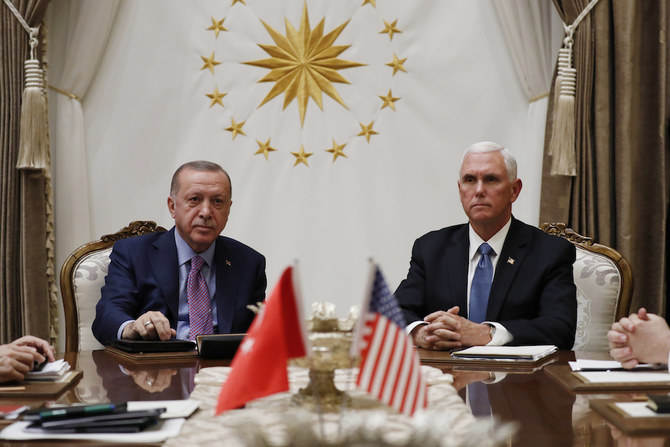
- Kurdish-led authority called for a corridor 'to evacuate dead and wounded civilians'
- Turkish assault has created a new humanitarian crisis in Syria with 200,000 civilians taking flight
US military starts pier construction off Gaza

- But humanitarian aid coming off the pier will need to pass through Israeli checkpoints on land
- Despite the aid having already been inspected by Israel in Cyprus prior to being shipped to Gaza
WASHINGTON: US troops have begun construction of a maritime pier off the coast of Gaza that aims to speed the flow of humanitarian aid into the enclave when it becomes operational in May, the Pentagon said on Thursday.
President Joe Biden announced the pier in March as aid officials implored Israel to ease access for relief supplies into Gaza over land routes. Whether the pier will ultimately succeed in boosting humanitarian aid is unclear, as international officials warn of the risk of famine in northern Gaza.
Israel’s six-month-long military campaign against Hamas has devastated the tiny Gaza Strip and plunged its 2.3 million people into a humanitarian catastrophe.
A senior Biden administration official, speaking to reporters on condition of anonymity, said humanitarian aid coming off the pier will need to pass through Israeli checkpoints on land. That is despite the aid having already been inspected by Israel in Cyprus prior to being shipped to Gaza. Israel wants to prevent any aid getting to Hamas fighters that boosts their war effort.

The prospect of checkpoints raises questions about possible delays even after aid reaches shore. The United Nations has long complained of obstacles to getting aid in and distributing it throughout Gaza.
“I can confirm that US military vessels, to include the USNS Benavidez, have begun to construct the initial stages of the temporary pier and causeway at sea,” Pentagon spokesperson Major General Patrick Ryder told reporters.
Concerns about the risk to American troops getting caught up in the Israel-Hamas war were underscored on Thursday as news emerged of a mortar attack near the area where the pier will eventually touch ground. No US forces were present, however, and Biden has ordered US forces to not step foot on the Gaza shore.
The pier will initially handle 90 trucks a day, but that number could go up to 150 trucks daily when it is fully operational. The United Nations said this week that the daily average number of trucks entering Gaza during April was 200 and that there had been a peak on Monday of 316.
The official added that about 1,000 US troops would support the military effort, including in coordination cells in Cyprus and Israel.
A third party will be driving trucks down the pier onto the beach, the official added.
The northern Gaza Strip is still heading toward a famine, the deputy UN food chief said on Thursday, appealing for a greater volume of aid and for Israel to allow direct access from its southern Ashdod port to the Erez crossing.
In a statement, the Israeli military said it would provide security and logistics support for the pier.
An Israeli military brigade, which includes thousands of soldiers, along with Israeli Navy ships and Air Force would work to protect US troops who are setting up the pier.
Ryder said the Pentagon was tracking some type of mortar attack in Gaza that caused minimal damage in the marshalling area for the pier. But he added that US forces had not started moving anything to that area yet and there were no US forces on the ground.
Hamas official says Israel ‘will not achieve’ goals in Rafah
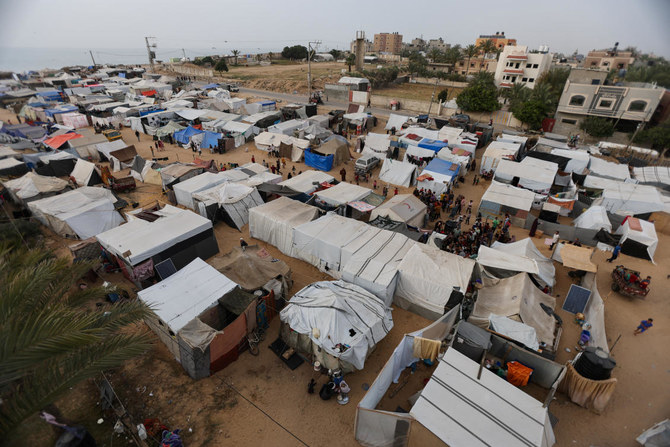
- “Even if (Israel) enters and invades Rafah, it will not achieve what it wants,” Ghazi Hamad said
- “This will undoubtedly threaten the negotiations because it is clear from this declared position that Israel is interested in continuing the war“
GAZA STRIP, Palestinian Territories: A senior Hamas official told AFP on Thursday that Israel would fail to meet its stated goals of defeating the Palestinian militant group and freeing hostages by invading the southern Gaza city Rafah.
“Even if (Israel) enters and invades Rafah, it will not achieve what it wants,” Ghazi Hamad said in an interview over the phone from Qatar, where a number of senior figures from Hamas’s political bureau are based.
Hamad said Israel had “spent nearly seven months in Gaza and invaded all areas and destroyed a lot, but so far has not been able to achieve anything of its main goals, whether eliminating Hamas or returning the captives.”
Israel has vowed to move on with the planned military operation in Rafah, despite international outcry and concern for about 1.5 million Palestinians sheltering in the city.
There are fears of huge civilian casualties and countries including Israel’s top ally and weapons supplier the United States have warned Israel against sending troops into Rafah.
“We have spoken with all parties involved in the conflict... about the seriousness of invading Rafah and that Israel is heading toward committing additional massacres and additional genocide,” Hamad said.
“This will undoubtedly threaten the negotiations because it is clear from this declared position that Israel is interested in continuing the war and aggression and has no intention of continuing negotiations and reaching an agreement,” he said.
Qatar, the United States and Egypt, have been mediating talks to secure a truce and the release of hostages, but those have stalled for days.
An Egyptian delegation is however set to travel to Israel on Friday to kickstart a new round of talks, Israeli media reported citing unnamed officials.
Israeli government spokesman David Mencer said Israel’s war cabinet was meeting Thursday “to discuss how to destroy the last battalions of Hamas.”
On Wednesday, Mencer said that since Israel began its ground invasion of Gaza on October 27, the army has destroyed “at least 18 or 19 of Hamas’s 24 battalions.”
Officials say the remaining battalions are in Rafah — the main target of the impending assault.
Most Gazans taking refuge in Rafah are sheltering in makeshift camps, and even before the start of the expected ground invasion, the city near the Egyptian border has been suffering regular Israeli bombings.
Hamad argued the planned invasion was exposing contradictions in Israeli Prime Minister Benjamin Netanyahu’s stance on Gaza.
“Netanyahu is stumbling because, on the one hand, he wants to return the captives to their families, as he says, but at the same time, he puts them in great danger, as his army deliberately killed many hostages.”
Israel’s army has admitted to mistakenly killing some hostages in Gaza.
Hamad accused Netanyahu of “manipulating and procrastinating” in a bid to “deceive the Israeli public that there are negotiations and deceive the international community as well that there are negotiations.”
He said the Israeli prime minister was “trying to twist the truth” and claim that “Hamas is the obstacle in these negotiations.”
Hamad said Qatar and Egypt were “making great efforts to reach an agreement,” but argued “the Israeli side unfortunately deals with the matter foolishly and is very confused.”
Hamad also told AFP that Hamas, which took power in Gaza in 2007, was already working on plans for the territory after the war.
He said the group was “working on the post-war phase to ensure that there is a great effort to rebuild the Gaza Strip and provide the necessities for a decent life.”
Palestinian militants took around 250 hostages to Gaza during Hamas’s October 7 attack that triggered the war.
Israeli officials say 129 hostages are still held in Gaza, including 34 the military says are dead.
The attack on southern Israel resulted in the deaths of 1,170 people, Israelis and foreigners, according to an AFP tally based on official Israeli figures.
Israel’s retaliatory offensive against Hamas in Gaza has killed 34,305 people, most of them women and children, according to the territory’s health ministry.
Shawarma restaurant in Cairo brings taste of home for displaced Palestinians
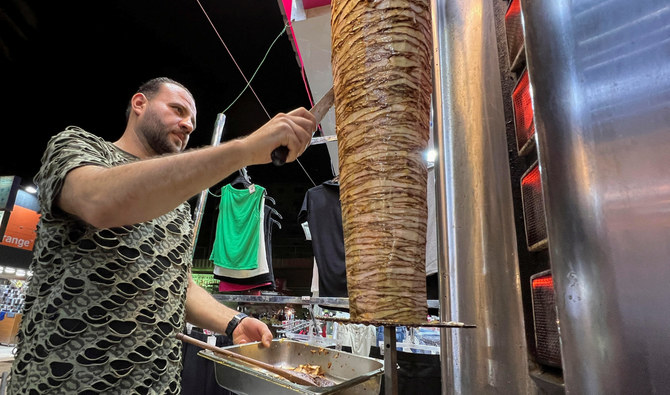
CAIRO: A Palestinian businessman displaced by the war in Gaza is bringing a taste of home for fellow refugees with a shawarma restaurant he has opened in Cairo.
“The Restaurant of Rimal Neighborhood” offers shawarma, a Middle Eastern dish of thinly sliced meat, and other Palestinian and Arab dishes.
“The name comes to eternalize Rimal, my neighborhood, and my homeland too,” said Basem Abu Al-Awn.
“It is also to replace the restaurant I once had in Gaza. Two restaurants of mine, in addition to my house and the houses of my relatives, were destroyed,” he said.
Abu Al-Awn hopes his time outside Gaza will be temporary, and he is determined to return to the enclave once the war between Israel and Hamas is over.
“I will return, even if I have to set up a tent near the rubble of my house. We are going back to Gaza, and we will rebuild it,” he said.
Rimal was Gaza City’s busiest shopping center, with large malls and main bank offices before Israeli forces reduced most of it to rubble.
It was also home to Gaza’s most famous shawarma places.
“The taste is the same. People tell us it tastes as if they are eating it in Gaza,” said Ahmed Awad, the new restaurant’s manager.
“The Egyptians who get to try our place keep coming back. They tell us the taste is nice and is different from the shawarma they usually get,” Awad said.
Gaza shawarma spices are unique and scarce in Cairo, so credit goes to Awad’s father, who mixes those available to give the dish a special Palestinian taste.
Many thousands of Palestinians have arrived in Gaza since the war began last October.
Awad, his wife, and four children arrived in Cairo three months ago.
In Gaza, he used to work in restaurants specializing in oriental and Western dishes.
With an end to the war looking like a distant prospect, Awad urged Palestinians not to give up.
“I advise them to work and take care of their lives. Their houses and everything may have gone, but no problem; it will come back again,” he said.
“Once things are resolved, we will return home, work there, and rebuild our country.”
Palestinians now stranded in Cairo include businessmen, students, and ordinary families who say they seek temporary legal residency to pursue investment and study plans until a ceasefire is in place.
Om Moaz, from Rafah in the southern Gaza Strip, had been struggling to pay for a rented house and treatment for her husband and daughter in Cairo. She began working from home, offering Palestinian food through social media.
She found there was a strong demand from both Egyptians and Palestinians.
“Some were in the war and came to Egypt. So they started ordering my food. And thank God, it’s a successful business, and hopefully, it continues,” she said.
‘Let’s help Yemen regain ability to chart its own future,’ US envoy Tim Lenderking tells Arab News

- Lenderking says it would be a ‘terrible tragedy’ to squander progress in Yemen peace process amid ‘competing crises’
- US envoy calls on Iran to stop fueling the conflict in Yemen and halt smuggling weapons to the Houthi militia
NEW YORK CITY: Houthi attacks on international shipping in the Red Sea and the Gulf of Aden in response to Israel’s military offensive against Hamas in Gaza must not derail the peace process in Yemen, Tim Lenderking, the US special envoy for Yemen, has said.
Since the war in Gaza began in October last year, attacks by the Houthis on commercial and military vessels in the strategic waterways have caused significant disruption to global trade.
The Iran-backed armed political and religious group, formally known as Ansar Allah, views itself as a part of the Iranian-led “Axis of Resistance” against Israel, the US and the wider West.
It has threatened to continue its attacks on vessels until Israel ends its assault on Gaza. Since January, the UK and the US, in coalition with five other countries, have responded with retaliatory strikes against Houthi targets in Yemen.
The US will halt these retaliatory strikes when the Houthi militia stops its attacks on shipping, Lenderking told Arab News in an interview, placing responsibility for de-escalating the situation in the militia’s hands.
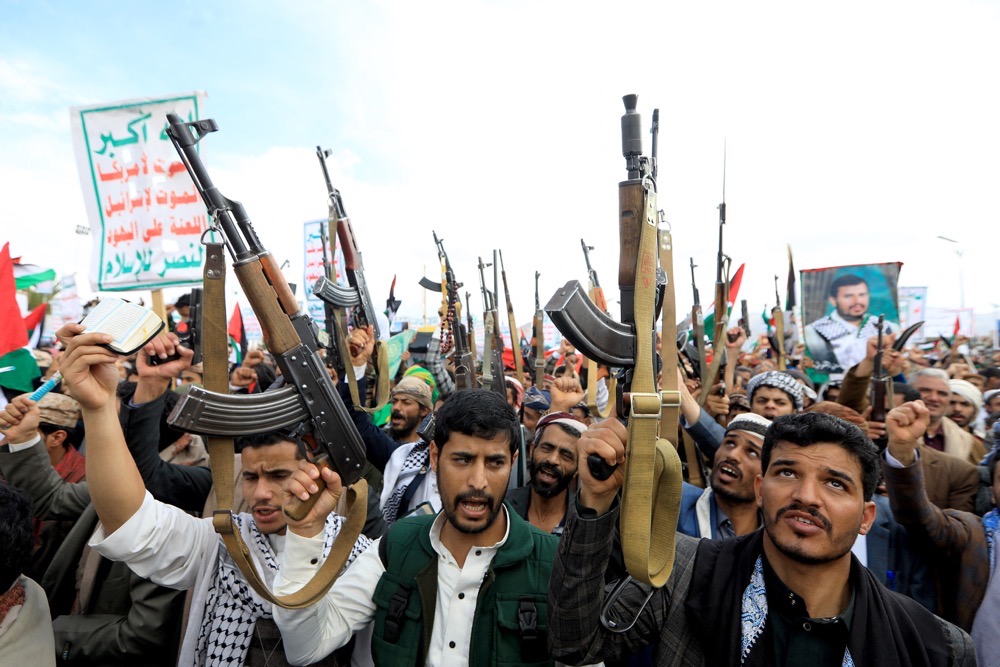
“The onus (is) on the Houthis to stop the Red Sea attacks,” he said. “That can prompt us all to begin to dial back, to de-escalate, to return the situation in Yemen to where it was on Oct. 6, which had considerably more promise and possibility than what exists now, and that’s where we want to return the focus.”
Lenderking called on Iran to “stop fueling the conflict (and) stop smuggling weapons and lethal material to Yemen, against UN Security Council resolutions.”
Yemen had never been so close to peace before the process was derailed by the latest regional turmoil, said Lenderking. The Yemeni civil war has gone on too long, he said: “It must stop.”
“The Yemeni people (have) suffered from this war for eight years now. They want their country back. They want their country (to be) peaceful. They don’t want foreign fighters in Yemen. They don’t want the Iranians in Sanaa. They don’t want the IRGC, the (Islamic) Revolutionary Guard (Corps) wandering around in Sanaa.
“Let’s help Yemen regain its country and its ability to chart its own future. That’s what the US so, so dearly wants.”
He added: “We’re trying very hard to marshal and maintain an international effort to keep the focus on Yemen’s peace process, on the very critical humanitarian situation.
“But look at what’s crowding us out: Terrible tragedy unfolding in Gaza. Russia’s war in Ukraine. Afghanistan. Sudan. There are many competing crises that are dominating the attention of the US and the international community.”
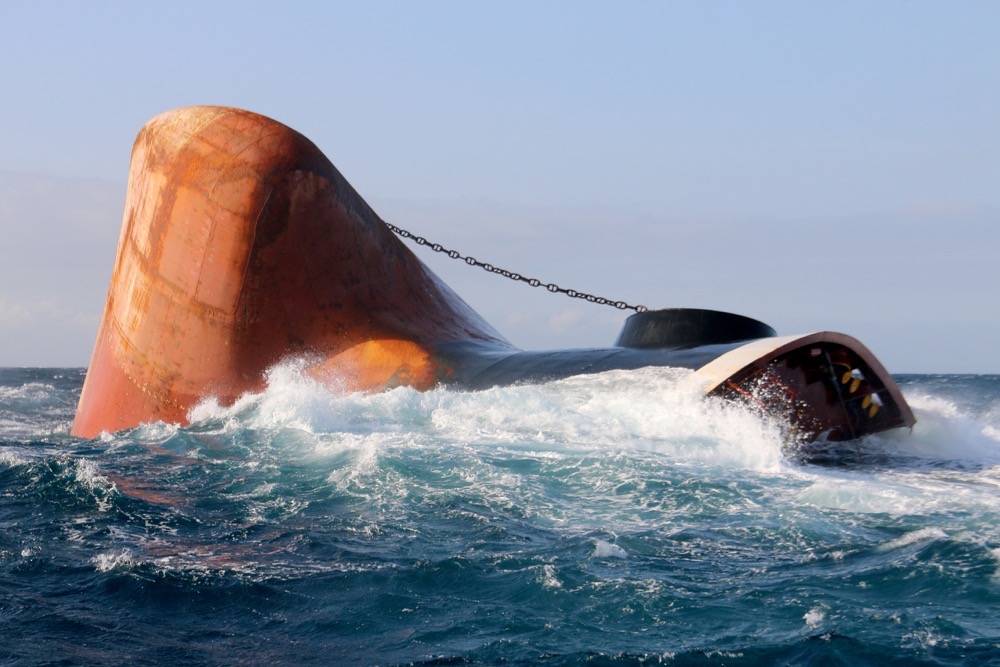
While the war in Yemen is linked to other conflicts raging in the region, the UN has recently said the world owes it to the Yemenis to ensure that resolving the war in Yemen is not made contingent upon the resolution of other issues, and that Yemen’s chance for peace does not become “collateral damage.”
“We cannot escape what’s happening in Gaza,” said Lenderking. “Not one single day goes by when the people I talk to about Yemen don’t also talk about Gaza. So we know this is a searing and very, very important situation that must be dealt with.
“This situation is holding up our ability to return the focus to the peace process in Yemen, to take advantage of a road map that was agreed to by the Yemeni government and by the Houthis in December, and get the Houthis to refocus their priorities not on Red Sea attacks — which are hurting Yemenis by the way, hurting Yemen — but to the peace effort in Yemen itself.”
Speaking during a UN Security Council briefing last week, Hans Grundberg, the UN envoy for Yemen, said the threat of further Houthi attacks on shipping persists in the absence of a ceasefire in Gaza — the urgent need for which was underscored by the recent escalation in hostilities between Israel and Iran.
Lenderking said: “We continue to hear from the Houthis that these (two) issues are linked and that (the Houthis) will not stop the attacks on Red Sea shipping until there’s a ceasefire in Gaza.
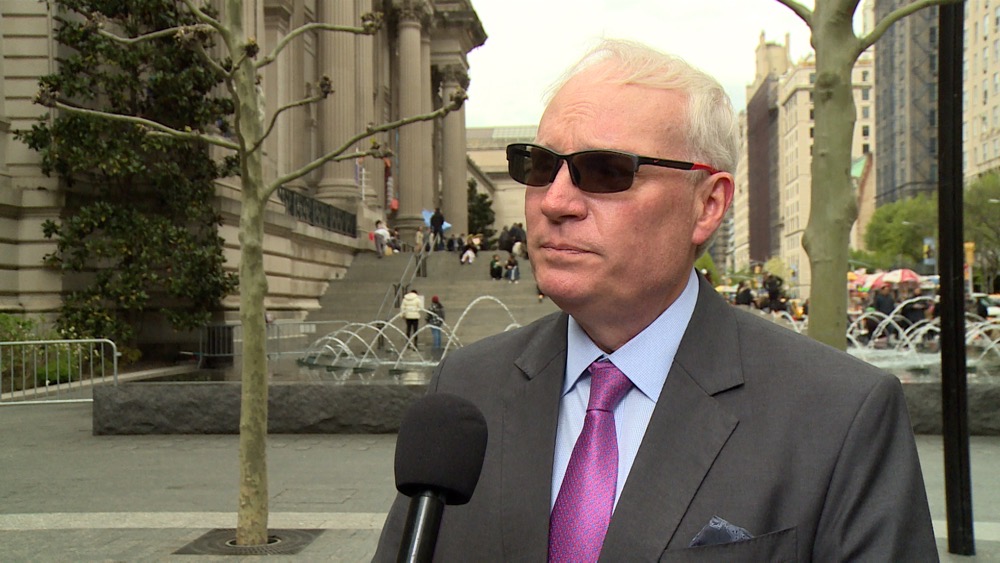
“We believe there’s essential progress that could be done now. There are 25 members of the Galaxy Leader crew, the ship that was taken by the Houthis on Nov. 19 last year, still being held.
“They’re from five different countries. There is no reason why these individuals, who are innocent seafarers, are being detained in Hodeidah by the Houthis. Let them go. Release the ship. There are steps that could be taken. We could continue working on prisoner releases.
“These kinds of things will demonstrate to the Yemeni people that there’s still hope and that the international community is still focused on their situation.”
Lenderking said it would be a “terrible tragedy” to squander the progress toward peace that had been made in the previous two years.
A truce negotiated in April 2022 between the parties in Yemen had initially led to a reduction in violence and a slight easing in the dire humanitarian situation in the country. Two years on, the UN has lamented there is now little to celebrate.
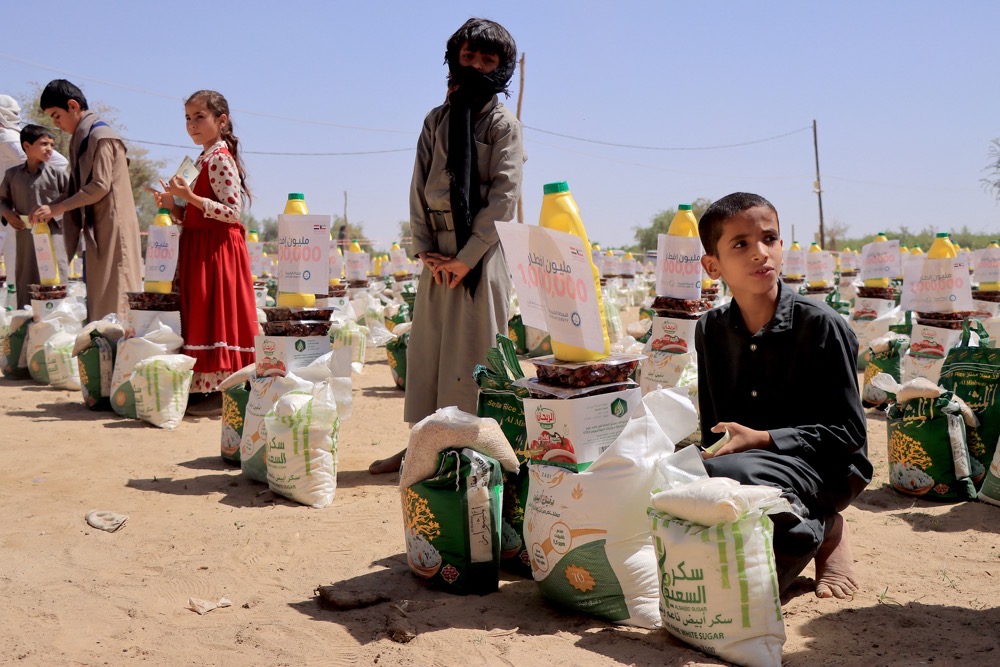
“Detainees we had hoped would be released in time to spend Eid with their loved ones remain in detention,” said UN envoy Grundberg. “Roads we had hoped to see open remain closed.
“We also witnessed the tragic killing and injury of 16 civilians, including women and children, when a residence was demolished by Ansar Allah (Houthi) individuals in Al-Bayda governorate.”
The humanitarian situation in Yemen has also become markedly worse in recent months amid rising food insecurity and the spread of cholera.
Edem Wosornu, director of operations and advocacy at the UN Office for the Coordination of Humanitarian Affairs, told the Security Council in the same briefing that the situation had deteriorated further after the World Food Programme suspended the distribution of food aid in areas controlled by the Houthis in December 2023.
This pause followed disagreements with local authorities over who should receive priority assistance and was compounded by the effects of a severe funding crisis on WFP humanitarian efforts in Yemen.
“The most vulnerable people — including women and girls, marginalized groups such as the Muhamasheen, internally displaced people, migrants, asylum seekers and refugees, and persons with disabilities — still depend on humanitarian assistance to survive,” said Wosornu.
Wosornu also voiced concern about an increase in cases of cholera in Yemen amid the deterioration of public services and institutions.
“The re-emergence of cholera, and growing levels of severe malnutrition, are telling indicators of the weakened capacity of social services,” she said.
“Almost one in every two children under five are stunted, more than double the global average: 49 percent compared to 21.3 percent.
“Emergency stocks of essential supplies are almost depleted. And water, sanitation and hygiene support systems need urgent strengthening.”
The humanitarian response plan for Yemen is only 10 percent funded, with funding for its food security and nutrition programs standing at just 5 percent and 3 percent respectively, according to an informal update presented to the Security Council by the OCHA this week.
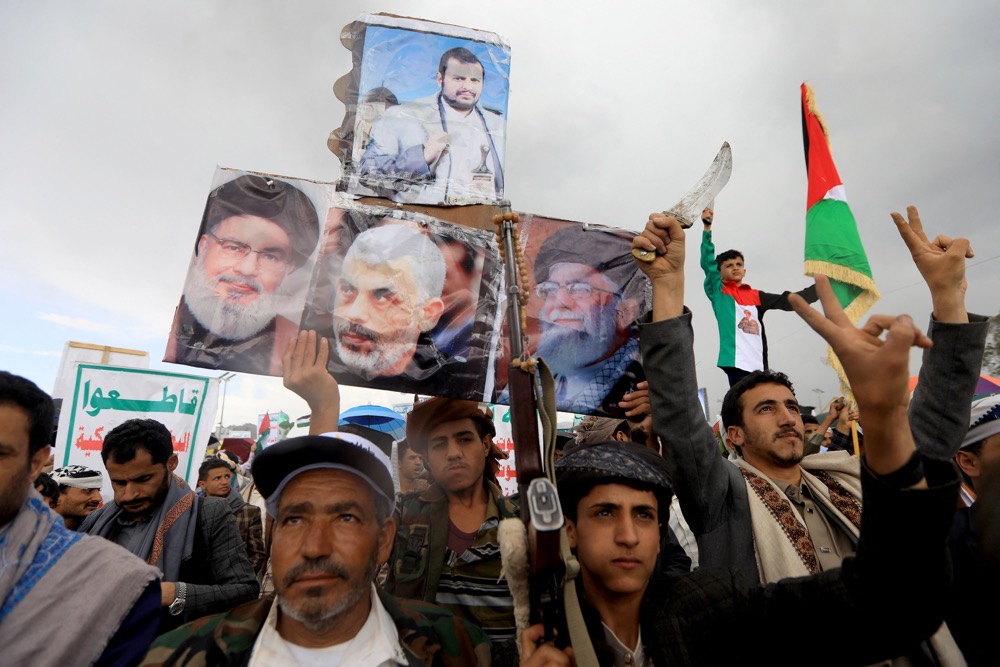
Wosornu appealed to the international community to take urgent action to help fill the funding gaps.
Commenting on the funding shortage, Lenderking said: “When there’s a genuine possibility of a Yemen peace process, donors will take note of that and respond. But the fact that we’re in this limbo, where the peace process is on hold while the Houthi is continuing these attacks (in the Red Sea), that I think is to be blamed on the Houthis because they’re derailing what was a legitimate peace process.
“But once we can get back to that, I think we could call on the international community to say, look, there is a ray of hope. There is a process. There is a commitment. The US is supporting an international effort. We can get the donors to come back to Yemen, despite all of the competition for these very scarce resources.”
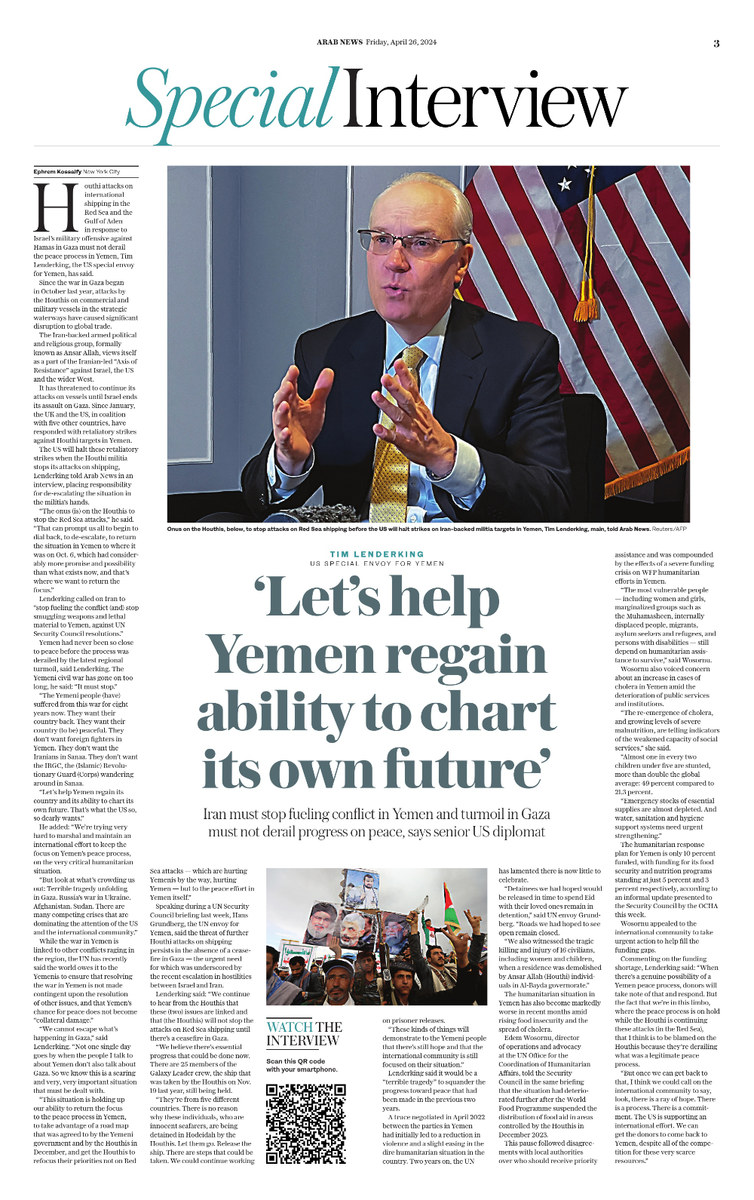
British Royal Navy shoots down missile for first time since Gulf War in 1991 amid Houthi attacks on shipping
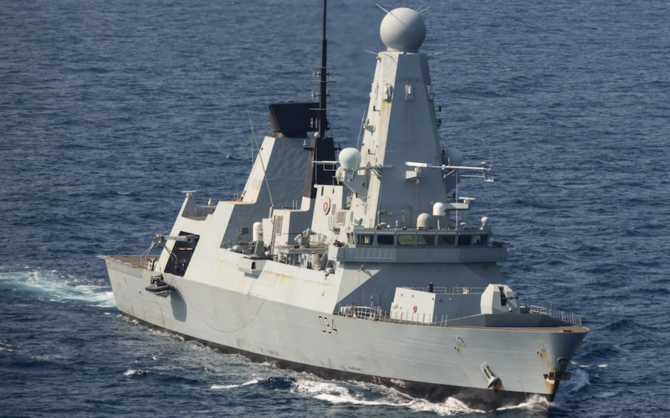
- Iran-backed group said its missiles targeted US ship Maersk Yorktown, an American destroyer in the Gulf of Aden and Israeli ship MSC Veracruz
LONDON: A British Royal Navy destroyer shot down a ballistic missile on Wednesday for the first time since the first Gulf War in 1991, the UK’s defense secretary told The Times newspaper.
In a report published Thursday, Grant Shapps told the newspaper that HMS Diamond used its “Sea Viper” missile system to target the weapon, which Yemen’s Houthi militia said they used to target two American ships in the Gulf of Aden and an Israeli vessel in the Indian Ocean.
The Iran-backed group said its missiles targeted US ship Maersk Yorktown, an American destroyer in the Gulf of Aden and Israeli ship MSC Veracruz in the Indian Ocean, its military spokesman Yahya Sarea confirmed.
It is the first such attack from the Yemeni militia in two weeks in the region, where Royal Navy Type 45 destroyers have been deployed to protect commercial ships since the Houthis initiated strikes on global shipping in November last year in solidarity with Palestinians in Gaza.
“The Yemeni armed forces confirm they will continue to prevent Israeli navigation or any navigation heading to the ports of occupied Palestine in the Red and Arabian Seas, as well as in the Indian Ocean,” Sarea said on Wednesday.
Shapps said the latest Houthi attack was an example of how dangerous the world was becoming and how “non-state actors were now being supplied with very sophisticated weapons” from states such as Iran.
His comments came after UK Prime Minister Rishi Sunak this week pledged to increase spending on British defense to 2.5 percent of national income, something Shapps said was “so vital” given continued tensions in the Middle East.




